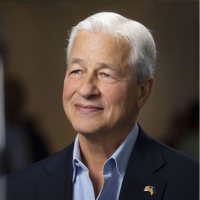
JPMorganChase | New York, New York
For his steadfast leadership in building JPMorganChase into a diversified global financial institution and his powerful advocacy on behalf of the American business community and its worldwide role and responsibilities.
Jamie Dimon, Chairman and Chief Executive Officer of JPMorganChase, stands among the most influential business leaders of his generation, widely recognized for his stewardship of America's largest bank and his distinct vision of banking as a powerful engine for community growth and economic inclusion. Guided by his deeply held belief that the health of banks and their communities are fundamentally intertwined, Dimon has redefined how financial institutions can—and should—engage with society. Over decades of transformative leadership, particularly during times of crisis, he has emerged as an advocate for a more thoughtful, responsible, and community-oriented approach to finance.
Born in New York City, Dimon was introduced early to the world of finance, inspired by his father and grandfather, both stockbrokers. He attended Tufts University, majoring in economics and psychology, before pursuing an MBA at Harvard Business School.
Dimon's ascent through the banking world began when he joined American Express, working closely with legendary executive Sandy Weill. Their professional relationship flourished, leading Dimon to join Weill in building Citigroup, one of the largest financial institutions in the world. In 2004, Dimon became COO of JPMorganChase, quickly rising to CEO by the end of 2005. His arrival marked a transformative moment for the bank, infusing it with renewed focus, operational discipline, and strategic clarity. He reorganized business lines, emphasized transparency, and notably insisted on rigorous internal risk controls, including divestment of subprime mortgage securities—measures that would soon prove critical. As a global financial crisis began to unfold in 2007–2008, many banks found themselves dangerously exposed to complex mortgage securities. Under Dimon's disciplined approach, JPMorganChase emerged as a stabilizing force, uniquely positioned to navigate the turmoil.
In the darkest hours of the financial crisis, when uncertainty and fear gripped global markets, Dimon's decisive actions demonstrated both financial acumen and public responsibility. JPMorganChase acquired struggling investment bank Bear Stearns as well as Washington Mutual’s banking operations after its collapse, transactions that were crucial to restoring confidence in the financial system and protecting consumer savings and deposits. Despite intense scrutiny and challenging integration processes, Dimon's strategy was ultimately vindicated: JPMorganChase not only weathered the storm but emerged stronger. Throughout the crisis, Dimon’s leadership was widely credited with reassuring investors, regulators, and the public alike.
But Dimon's vision extends beyond financial discipline and market leadership. From his childhood in Queens, Dimon noted that his vibrant, multi-ethnic community was strengthened by a strong relationship between businesses and residents. He has consistently argued that banks have a unique responsibility to contribute positively to society, emphasizing investments in community development and economic equity.
Under Dimon's guidance, JPMorganChase launched ambitious initiatives to support underserved communities, notably in Detroit. At a time when the Motor City faced bankruptcy and population decline, Dimon committed hundreds of millions of dollars toward revitalizing neighborhoods, spurring small-business growth, and creating opportunities for local residents. This initiative became a blueprint for how private-sector institutions can collaborate with civic leaders to spark lasting, inclusive economic development.
Expanding beyond Detroit, Dimon led JPMorganChase to launch comprehensive investments in cities nationwide—including Chicago, Dallas, and Washington D.C. These efforts focused on affordable housing, workforce development, small business lending, and infrastructure improvement. Dimon emphasized that such investments were not simply acts of philanthropy but were sound business strategies.
Dimon's advocacy has not gone unnoticed. He has been recognized repeatedly by major financial publications as one of the world's most respected and effective business leaders. Yet, even amid such accolades, Dimon underscores his conviction that the truest measure of success is not quarterly earnings but the positive, tangible impact his institution has on society.
Today, Jamie Dimon continues leading JPMorganChase with the same principles he has championed for years. In an age of unprecedented global challenges, from economic inequality to climate risks, his steadfast insistence that banking must serve broader societal goals remains deeply influential. Whether addressing corporate boardrooms, policymakers, or everyday Americans, Dimon underscores that investing in people, communities, and the economy ultimately strengthens the banking system itself. In doing so, Jamie Dimon embodies a modern vision of business leadership—one defined not only by profits, but also by purpose, responsibility, and lasting societal impact.
Information as of April 2025.

